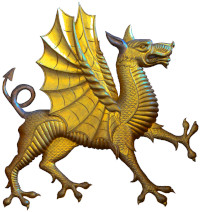Lines 499-558 of John McNamara’s translation
Unferth, who was offended that Beowulf had claim to winning more glory than he, “throughout middle-earth and under the heavens,” challenged Beowulf as being second to a certain Breca, who claimed to have won a contest with Beowulf when they were youths in which they “gambled” their “lives in the ocean deep.” The tail of the young warriors swimming in mail shirts with swords deep into the ocean is heroically unreal. Yet there are hints in this objection to Beowulf claiming sea-taming might that this interlude reflects a tail of migration similar to the Argonautica, Odyssey and Aeneid.
Both of the heroes struggled seven nights in the wildness of winter seas and like many a set of mariners separated by storm [Columbus and Ponzon, Magellan and his returned captain] late disagreed as to who was at fault, when the weather certainly had much bearing on the fate of their nautical enterprise. The seven night struggle is a clear sign that we are dealing here with the mythic realm of symbolism. Breca swam to shore and founded a kingdom reflecting a tale of some migratory journey in which the chiefs were scattered and found various homelands.
Beowulf retorts:
Lines 530-534
“Well, my friend Unferth, besotted with beer,
you have brought forth much about Breca
told tales of his venture! Yet I tell the truth,
that I have proved greater in sea-strength,
more of a match for the waves, than any other man.”
Beowulf goes on to describe an unreal swim at sea, extolling the strength of his sail, demonstrating in the poet’s hands that this tale is an allegory for some sailing venture, most likely in multiple ships by mariners separated and driven to diverse fates by the storms of the northern seas. His recounting of the monstrous battle is grimly fanciful:
Lines 553-558
“…One dreaded foe drew me
down to the deep, holding me fast
in its gruesome grip. Yet to me it was given
that I struck the sea-monster with the point of my sword, [1]
a blade proved in battle. Thus through my hand,
the storm of my sword swept the beast away.” [2]
One point about the sword’s importance to social status among Аrуаn peoples should be considered. The sword is a most useful weapon onboard a ship and the Sea Peoples who defeated the chariot armies of the Near East during the Bronze Age Collapse were depicted as wielding swords.
End Section 8
…
Notes
-1. The “point” of the sword was an ideal that was more ancient than the Dark Age in which this Germanic tale was complied, indicating that it might reflect a greater antiquity, whence swords such as the aor were hard and brittle and much used for the thrust.
-2. The sword was the weapon of the elite, the commanding class, who due to their necessary hard-won wisdom, were older than the axe-men and spear-men of the shield wall. The sword was a good counter to the more persistent spear [requiring more hand strength] and the more powerful axe [requiring more core strength and energy], reflecting a side arm, something wielded when wounded, or tired or when a main weapon was broken. This the sword was the arm of the leader, and when he unsheathed it, the final commitment was made, either in him standing and dying at his command post or surging forward in hopes of a ruling from on high.











